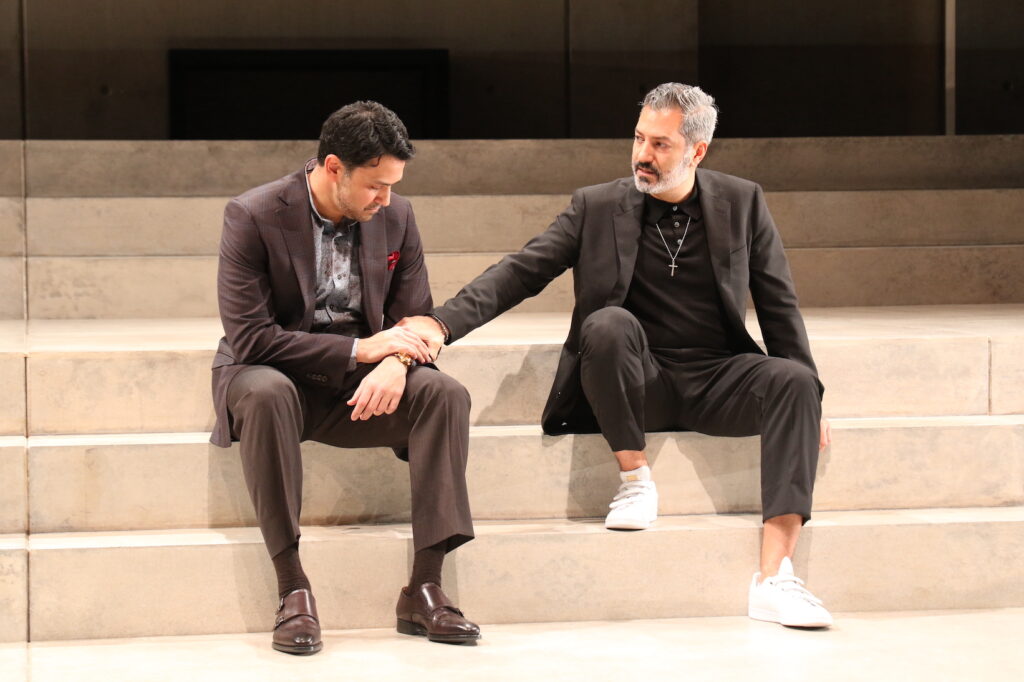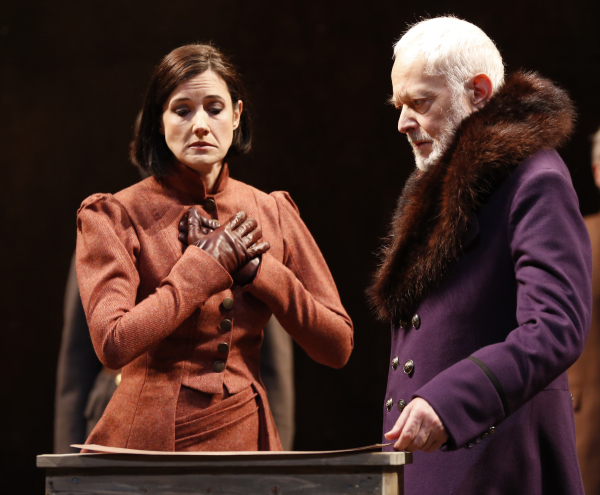By JK Clarke
Theatre for a New Audience (TFANA), in a co-production with Washington DC’s Shakespeare Theatre Company (STC), has taken a bold step in its new production of William Shakespeare’s The Merchant of Venice. But not for the expected reason (casting a black actor, John Douglas Thompson, in the role of the Jewish moneylender, Shylock). Rather, the production of Merchant in and of itself is bold in this era of hyper-sensitivity and rampant misunderstanding of nuance and message in art and literature. The Merchant of Venice is a tough, anguishing play that forces the audience (especially “Christians”) to examine their behaviors and ethics in a way that makes most of us uncomfortable. And despite a reluctance to stage the play, and in light of its recent ban from a New York City school, TFANA/STC has produced a thorough and impactful production of this sixteenth-century meditation on religious hypocrisy and intolerance, playing through March 6 at The Polonsky Shakespeare Center in downtown Brooklyn.

The story is straightforward and remarkably cynical for what’s categorized in the Shakespearean canon as a “comedy”: to pursue the lovely aristocratic Portia (a dynamic Isabel Arraiza), Bassanio (Sanjit De Silva) asks his successful merchant friend Antonio (Alfredo Narciso, who perfectly plays up the character’s sliminess, hammering home his hypocrisy as both a Christian and, in this production only, a closeted homosexual) for a sizable loan so that he might look wealthy and worthy enough of Portia’s love. Antonio’s assets are literally at sea (they are on ships in faraway lands and at substantial risk of being lost to weather or piracy), but wanting to help his “special friend” he requests a loan from the Jewish moneylender, Shylock, whom he despises for no other reason than pure bigotry and antisemitism. Naturally, after the loan is made, Antonio’s fortunes appear to be dashed upon a rocky shore; and Shylock, fed up with the relentless hatred shown him by the recipient of his accommodating loan (including being spat upon repeatedly, a repulsive act that resonates with a suddenly silenced audience), demands that his agreed-upon compensation for the loan, a pound of Antonio’s flesh, be paid in full. A corrupt court hearing changes everyone’s fortunes and Shylock ends up being horribly punished for seeking what he was contractually owed.


It must be daunting for other actors to share the stage with John Douglas Thompson in a Shakespeare production. For no matter how great their performance, they simply pale in comparison with his magnificent acting. And this Shylock may perhaps be one of his best roles. He’s sympathetic and measured, explaining his position in the most reasonable and professional manner possible, making him an unusually relatable Shylock. It doesn’t hurt that director Arin Arbus (with whom Thompson has collaborated many times) has amped up the contrast between Shylock and the Christians, such that even the most respectable of them, Portia, come off as ugly and harsh. Her famous Quality of Mercy speech—“The quality of mercy is not strained./ It droppeth as the gentle rain from heaven/ Upon the place beneath“—somehow ends up feeling self-serving and biased rather than the olive branch it should be. After that persuasive, diplomatic open, she sourly turns the tables on Shylock: “Therefore, Jew,/Though justice be thy plea, consider this:/That in the course of justice none of us/ Should see salvation.” She’s eager, so eager in fact that she and her assistant—in the guise (quite illegally and unethically) of a judge and his clerk—scramble desperately for some loophole in the law that might save Antonio’s skin. She’s not at all attempting to be equitable or judicious and Shylock, fed up with the hatred he’s been shown, becomes unreasonable in his outrage, eschewing an offer of triple the principle loan: “If you deny me, fie upon your laws!”


Arbus’s production is one that should be studied by students of Shakespeare. Contrasts are played up at every level to remarkable effect: Riccardo Hernandez’s Brutalist set of a daunting concrete wall and platform with a small set of unadorned concrete steps that run the breadth of the stage seems opposite what one should see in a town of wealthy merchants; and, Emily Rebholz’s present-day costumes that contrast the entitled Bro culture (who sport variations of leisurewear, or lesser quality suits) of the Venetian Christians with Shylock’s respectful business attire (a three-piece suit accented with his religious tallis shawl and kippah—a departure from the slovenly, threadbare garments worn by Shylock in many productions). More importantly, the entire cast exhibits a mastery of Shakespeare’s language (inspired, no doubt by Thompson’s perfection of the art), making it possible to both hear and understand every single word spoken on the stage. If this difficult task were practiced more often, I believe, Shakespeare would be considerably more popular than it is today.


Arbus ends this Merchant of Venice with the addition of text that’s not in the original play, a practice I generally abhor (but am more willing to accept in this instance as Arbus has used, once again, James Shapiro as the production’s Consulting Scholar). In this case, it’s the Kol Nidre prayer, the opening prayer of Yom Kippur, recited by Shylock and his daughter, Jessica (Danaya Esperanza) who had, earlier in the play, betrayed him. They stand in square spotlights on a dark stage, several feet apart from one another, looking heavenward. It is telling that they, and not the offending Christians, are looking for forgiveness and understanding from God for their weaknesses. It’s a recognition that things are often done in moments of rashness or under duress and that they intend to do better. That they are the only two characters requesting this forgiveness at the end of play lands darkly on one’s shoulders and tells us more than we’d like to know about humankind.
The Merchant of Venice. Through March 6 at Theatre For a New Audience’s Polonsky Shakespeare Center (262 Ashland Place, Downtown Brooklyn). www.tfana.org
Photos: Gerry Goodstein





















